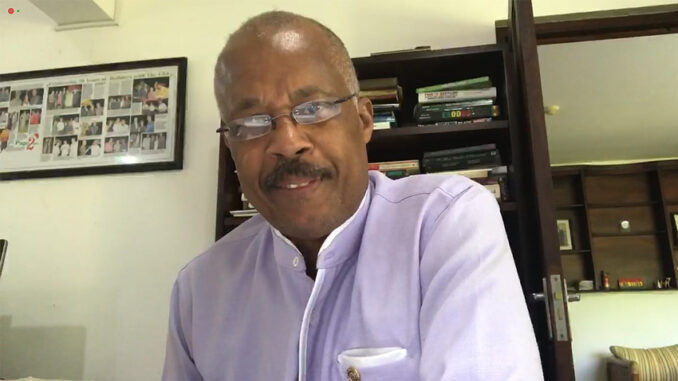
Beckles to European Parliament: ‘End colonialism in region and honour debt owed’
(UWITV) UWI’s Vice-Chancellor, Professor Sir Hilary Beckles, called upon the European Parliament to end colonisation in the region and honour its debt to the people. Invited to speak to the parliament (at a virtual international panel on December 2, 2020) during a special discussion on the poverty legacies of colonisation, he reminded the audience that Europe’s economic development was funded by a brutal and inhumane system of wealth extraction from the Caribbean, leaving the region impoverished and unable to meet its economic development targets.
Sir Hilary reminded the parliament that the Caribbean remains one of the few colonised regions in the world, and that Europe’s legacy is one of continuing economic exploitation, and the politics and policies of white supremacy. The Caribbean, he said, since pushing for its independence, has taken full responsibility for its future, but he noted that the responsibility and accountability relationship is a two-way process. Europe, he stated, walked away from its obligations after committing heinous crimes against humanity in the region, stripping it of its natural resources, and enslaving its people.
Left behind as the primary legacy is the horrendous social and economic mess that Europe has refused to clean up with a development plan, but the Caribbean has a right to economic fairness and justice.
Europe’s insistence on giving aid instead of economic development funding is reflective of an obsolete mentality that has no honourable place in the 21st century. It drives, for example, the impulse to blacklist the region’s financial sector, and to be unsupportive of economic diversification strategies.
“This is a top moral priority issue in the international order,” Professor Beckles said, noting that the world is aware of the extent to which Europe plundered the Caribbean to fund its growth and development, while the region is forced to fund its own economic development with debt. Europe, he insisted, owes the West Indies an enormous debt which can be addressed by a “Marshall Plan” similar to what it offered the East Indies with the “Colombo Plan” between 1950 and 2000.
Reparatory justice, he told the gathering, is about economic development partnership and support. He congratulated the parliament for recognizing that ‘repairing this legacy’ is an idea whose time has come.
More about the event
The Inaugural Commemoration of the European Day for the Abolition of the Slave Trade, hosted by the European Parliament, took place on December 2, 2020. Among the activities on this landmark day was a virtual international panel consisting of experts in diverse areas such as history; human, social and political science; African studies; feminism; and human rights. The event was themed, the Histories and Legacies of the Transatlantic Trade and Enslavement of Africans and People of African Descent in Europe and the Caribbean with a screening of the documentary series, “Enslaved” (2020).
Vice-Chancellor of The University of the West Indies and Chairman of the CARICOM Reparations Commission, Professor Sir Hilary Beckles was a featured panellist on the session titled: Repairing the Present, Building the Future. For the full event agenda visit https://www.ardi-ep.eu/inaugural-european-parliament-commemoration-of-the-european-day-for-the-abolition-of-the-slave-trade/
Photo: UWI’s Vice-Chancellor, Professor Sir Hilary Beckles


